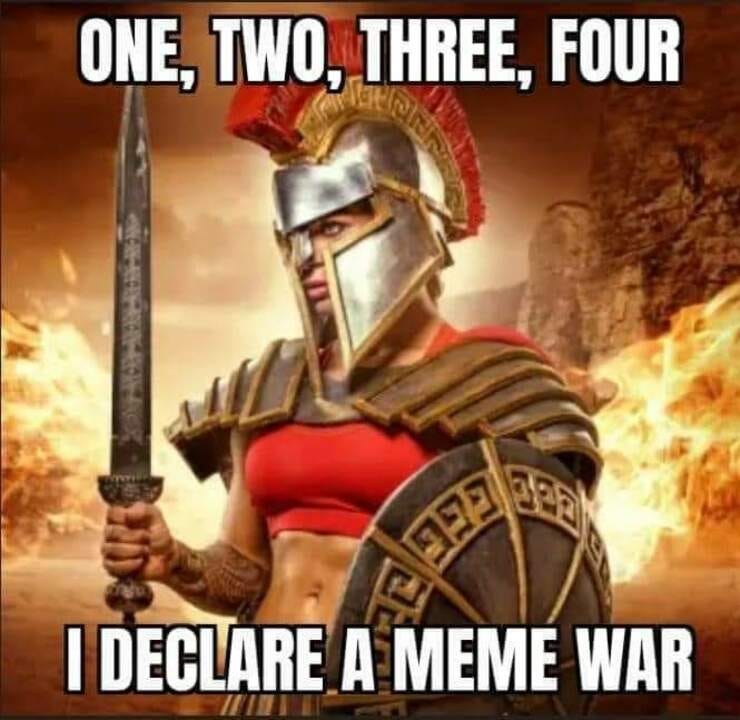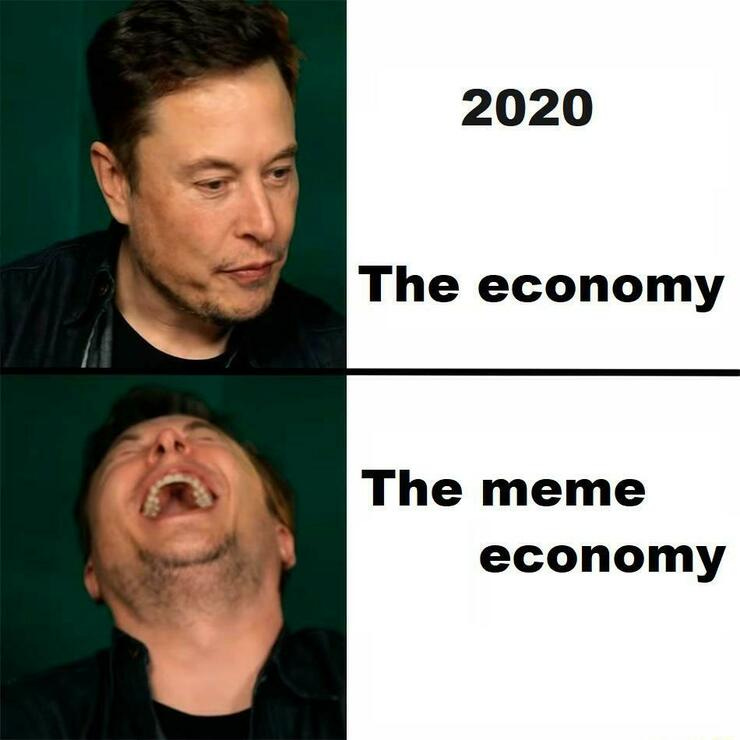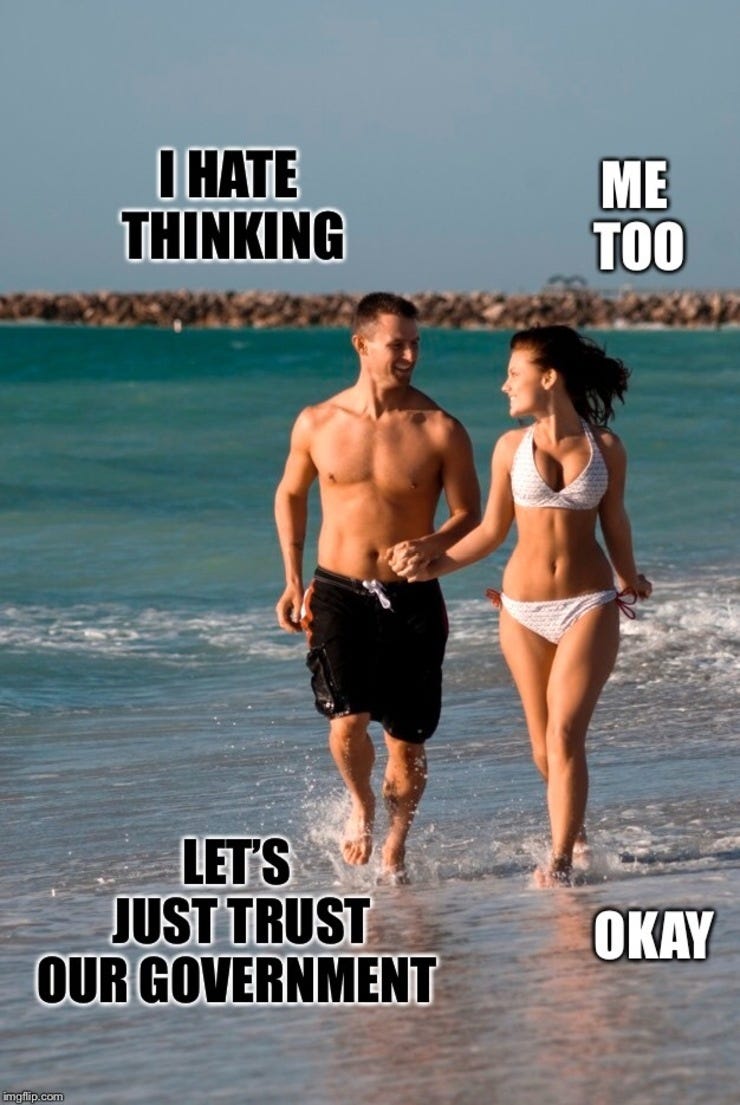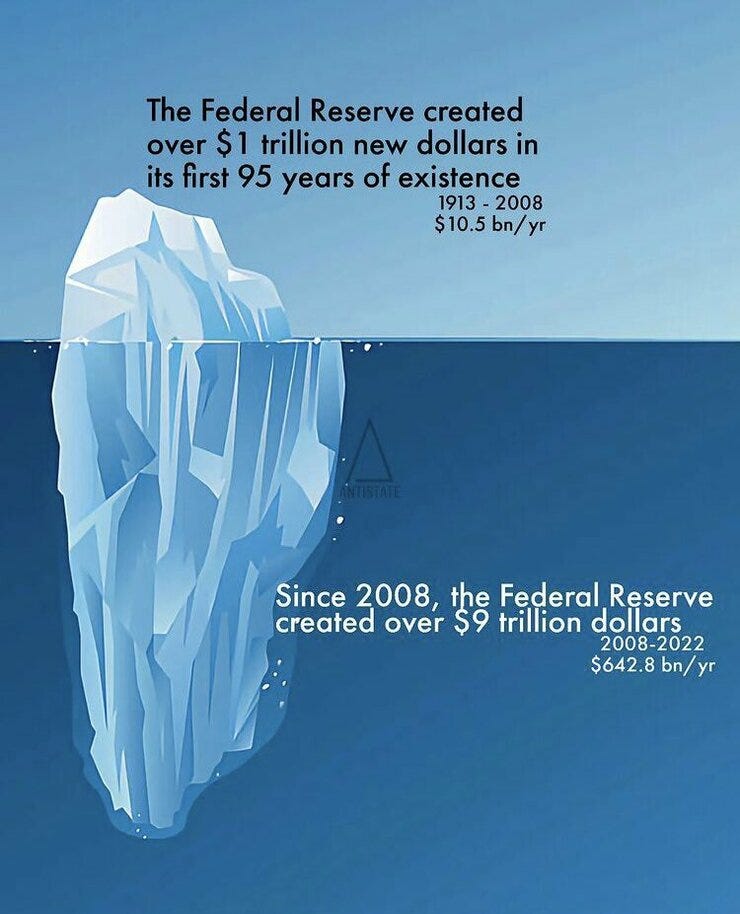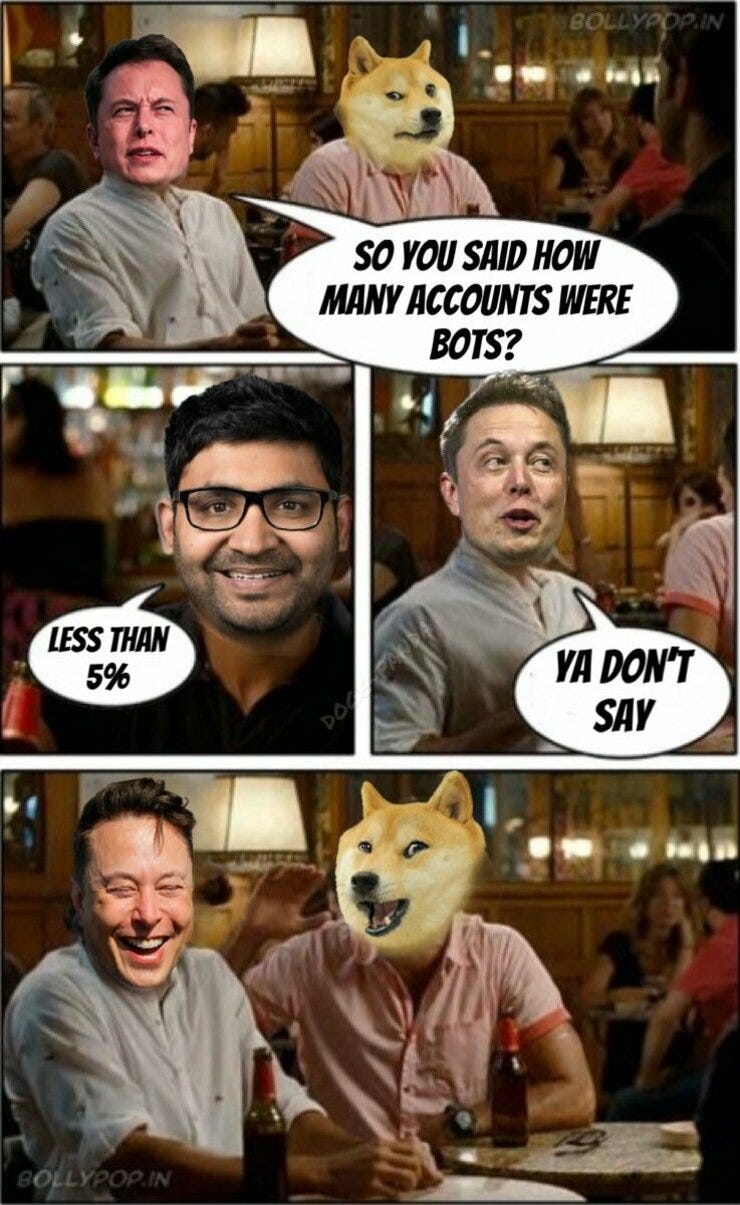After Covid, The World Needs Dogecoin
Hey everyone,
Last week, Joe Biden said the pandemic is finally over.
The past two and a half years have been one of the most intense, and divisive, periods in history.
Let’s take a look at the meme war that tore the world apart, and why we need Dogecoin to bring it back together.
The Pandemic Ends
Last Sunday on 60 Minutes, Joe Biden declared the pandemic over.
Covid-19 lasted 921 days. There can be little doubt that, for the general population, it was one of the most traumatizing events in recent history, comparable only to 9/11 in its total reshaping of day-to-day life.
The pandemic's impact has been dwindling for a while, but anecdotal evidence suggests we'll be reckoning with its psychological effects for a long time to come.
No matter whether you thought we were dealing with a naturally occurring pathogen, lab-created bioweapon, deep-state psyop, or some combination of the three, one thing is certain: massive fear was projected onto the population.
The main vector of fear was media, which has a nasty habit of exploiting an evolutionary foible in the brain that makes people pay more attention to bad news than good, known as negativity bias.
Ironically, bad news makes us less healthy by triggering states of fight-or-flight. What's good for media's bottom line is damaging to humanity itself.
Throughout the pandemic, coverage of the virus created a Catch-22: people felt a duty to be educated to protect their health. At the same time, exposure to negative media depictions of the virus led to unhealthy, low-vibrational states.
The destructive effects of this doom loop were obvious early on, but, with a constant stream of breaking news, new variants, and political conflict, it was hard to look away.
Because mass media tends to be uniformly negative, we tend to take for granted that it has to be this way.
This advertisement from El Salvador a rare example of how official Covid messaging could have been targeted to improve peoples' lives rather than just inform them of all the bad things to stress about:
At the group level, Covid fear widened existing schisms in our society: between urban and rural, coastal and middle American, Woke and MAGA, Globalists and localists, and among five generations of citizens, each with their own particular pandemic cross to bear.
This enforced division can't be undone overnight, but it's worth thinking about what actions might be taken to repair it.
To do so, it's necessary to understand the role that memes played during the pandemic.
Covid: A Memetic History
As the pandemic transformed from an acute emergency to years-long slog, it grew into something larger than a mere public health crisis: it became a meme war.
Zoom out far enough, and you'd see society splitting into two separate groups, defined not by political parties, ideologies, or demographic categories like race or class, but allegiance to different sets of memes.
For one group, the core memes were belief in authority, expertise, and The Science, especially as purveyed by official media outlets and reinforced by fact checkers. Their spiritual leader was Dr. Fauci.
The other group's core memes were self-sovereignty (especially medical freedom) and a staunch belief that the bureaucracies housing the experts and authorities were irredeemably corrupt. Trump was their unofficial figurehead, though the affiliation was looser than with Fauci.
These latter memes emanated from anonymous accounts on social media. In lieu of expert testimony or credentials, they tended to refer to heuristics like intuition, discernment, and gestalt reasoning to guide their thinking.
There was frighteningly little crossover between the two camps: each side formed their own informational ecosystem, attitudes toward in- and out-groupers, and trusted meme-dealers.
It was rare to find people fluent in both vernaculars.

Memes are subject to evolutionary pressures: only the strong survive.
The reason for this is that, when it comes to memes, the only meaningful measurement is Truth, a ruthless arbiter.
Similar to stand-up comedy, viral memes go viral because they resonate on a gut level with thousands of people. This authenticity can't be faked.
In the memetic arena, good intentions, academic titles, and political correctness count for nothing. The credentialed expert is afforded no retreat to his Ivy-league perch; when mixing it up with the commoners in the online agora, he either sinks or swims.
The pandemic meme war accelerated the pressures of memetic evolution, as reality itself grew weirder than any period in recent memory and folks spent more time holed up indoors sifting through memes.
The strongest memes—the ones that best captured lived experience—rose to the top. Everything else withered away.
In retrospect, the first heady months of 2020 saw the birth of something like a Cambrian Explosion of memes, or what might be termed The Great Pandemic Meme Boom.
As the memes evolved, they took on a greater role in peoples' lives than ever before, whether they realized it or not.
Weighty decisions—to mask, to vaccinate, to accept holiday visitors—often reduced to which set of memes you trafficked in.
Throughout 2020, the Trust-the-Experts memes carried the day.
Trump's combative and unpredictable leadership style was unnerving for many people in a psychosocial terrain already drenched with fear.
By contrast, Fauci's authoritative demeanor provided the reassurance Americans craved. Doubting the man who claimed "I represent science" invited the same opprobrium as questioning the government's motives after 9/11.
However, as power transferred from Trump to Biden in 2021, the battlefield shifted.
For one thing, the American media's refusal to address Biden's obvious cognitive decline gradually undercut its credibility.
The extent to which the mainstream was in the tank for Biden was nowhere more obvious than with the viral meme "Let's Go Brandon," spun off into not one but two chart-topping songs.
After a while, it seemed as if every time Biden opened his mouth he risked gifting his detractors more material to meme him with.
By the mid-2021, there were signs that The Experts had overplayed their hand when it came to Covid.
When 2021's Covid deaths surged past 2020's over the summer, the public was faced with the possibility that the medical and political authorities weren't actually getting any better at managing the virus, even as they arrogated more freedoms in the name of doing so.
This was especially true of mandates requiring a certain experimental medical treatment for the privilege of laboring, something that the broader public wasn't calling for before it was imposed from on high.

That the media sided reflexively with the mandates, and acted like the public had an ethical duty to do so as well (rather than simply reporting on how people felt about the state playing doctor) probably rubbed a lot of folks the wrong way, even if they didn't speak up against mandates publicly.

Around the same time, the anti-establishment coalition developed new memes like mass formation psychosis and trauma-based mind control to explain what they believed was really going on.
Agree or disagree with the validity of these concepts, it's undeniable that they gained traction with a large segment of the population, most notably during mRNA patent-holder Robert Malone's historic appearance on Joe Rogan to kick off 2022.
These memes put the expert camp on the defensive. When the mass formation meme went viral, the establishment rushed to contain its spread.
The Russian military operation in Ukraine was another turning point in the meme war and, arguably, marked the unofficial end of the pandemic as media redirected the public's outrage mid-stride from anti-vaxxers to Russia and Putin.
A few weeks after the war began, a powerful meta-meme popped up—"The Current Thing"—to describe the way the media deployed unceasing succession of crisis narratives to channel the public's attention.
It didn't help that the government immediately began funneling billions of taxpayer dollars to Ukraine and the defense industry after just having done the same for big pharma.
As a counter-meme to The Current Thing, Ukraine flags popped up across social media to show support for US military aid.
In its own strange way, the debate over military aid became a proxy battle in the pandemic meme war itself.
Mainstream and anti-establishment camps fell into predictable positions re support for Ukraine. Zelensky was the new Fauci, blue and yellow flags replaced masks, and Putin took on the role of heel, previously played by Trump.

While the public's eyes were on eastern Europe, evidence started to stack up that all was not right with the official pandemic narrative.
In April, a FOIA request uncovered a list of more than 1,200 side effects from clinical trials of the jab, data Pfizer unsuccessfully filed to keep from the public for 75 years.
Mainstream outlets studiously ignored these revelations, alarming as they were, while the anti-establishment rebels turned to memes to disseminate the data.
With Trump continuing to tout the jab as his administration's signature achievement, online authority-questioners coalesced around Elon, a more moderate and less polarizing figure with a willingness to dip his toes into the waters of controversy and a high level of meme literacy.
His campaign to restore free speech became a logical rallying point for independents, moderates, and free thinkers to push back against the establishment, especially the Silicon Valley giants who were so quick to shut down the conversation about the pandemic.
As Covid has slowly ambled off center stage of public life in 2022, there've been signs that the experts are ceding territory to the anti-establishmentarians.
For one thing, the political establishment seems to have waved the white flag on the idea of mandates while data piles up that the jabs are both riskier and less effective than initially advertised.
In a parallel development, tech companies have loosened their content moderation around the pandemic, allowing the public conversation to follow a more natural path.
People are finally permitted to question the efficacy of the jab, albeit in muted tones.

Lately, the meme war has shown signs of turning into a rout.
A big happening was the choice by developed nations England and Denmark to roll back vaccination programs for large groups of citizens.
In the US, the most striking evidence comes from child vaccination: recent data shows less than 2% of children under 5 are fully vaccinated for Covid despite an aggressive advertising campaign by big pharma.
The federal government has stopped buying vaccines and medical journals are starting to run articles critical of the jab.
Most surprisingly, a Congressional investigation blamed the Trump administration for pressuring the FDA to fast-track Operation Warp Speed, a stark departure from the earlier narrative that the jab must be celebrated.
With Fauci stepping down by the end of the year and Trump re-entering the meme game, there are hints that the meme war to define reality isn't actually over, but is just evolving once more.
The world is entering uncharted post-pandemic territory. If there's one lesson we can take from the last two and a half years, it's to keep your eyes on the memes.
Doge-demic
The Doge meme is a good place to start.
During the pandemic, Swole Doge vs. Cheems became a staple of meme culture.
The original meme appeared in a Spanish-speaking Facebook group in February 2020.
In the early days of Covid, it caught fire and spread across the Internet, proving endlessly malleable comic tool for comparing ideal and debased versions of a thing.
The virality of Swole Doge Vs. Cheems points to the way in which memes are useful for making arguments that might otherwise be too triggering and inflammatory to put into words.
Animals make particularly good memes in this respect, serving as a symbolic shorthand for aspects of our shared humanity. We have all been both Swole Doge and Cheems at various points in our lives.
In the kingdom of animal memes, Doge has assumed the role of top dog. A big reason is that it has better PR than its closest anthropomorphic challenger, Pepe the Frog
For all of Pepe's brilliance, its baggage means that some folks will probably never vibe with it. (For a full account of Pepe's nuanced history, take a look at this documentary).

In comparison, the Doge meme possesses near-universal charisma, making it useful for bridging the worst schisms of the last couple years.
Love of canines crosses boundaries. Dogs bring joy to humanity regardless of politics, geography, background, or other divisive categories.
Of course, it's impossible to grasp the rise of the Doge meme without understanding Dogecoin.
Barely two weeks into the Biden presidency—at the time thought to mark a return to normalcy—Dogecoin's explosion into the mainstream was easily one of the most surreal events of the last couple years.
If the pandemic proved anything, it's that memes are clearly worth something, but because they circulate as part of a free online gifting economy there hasn't always been a good method for assessing their true value.
Dogecoin is changing that, providing a monetary tool for measuring the value of memes.
Today, the Dogecoin community compensates meme-makers through various tipping mechanisms on Twitter, Reddit, and MyDoge Social Wallet.
Dogecoin also provides an answer for the economic devastation wrought by the pandemic.
When the government averted economic collapse in March 2020, it did so by dramatically increasing the money supply.
Today, we are living with the consequences of this program of money printing in the form of historically high inflation.
Prices aren't likely to come back down, even as wages for everyday workers have stayed flat. Middle and lower classes are getting hit the hardest, while economic elites have insulated themselves so far.
Central bankers, politicians, and other establishment experts have gaslit the public by acting surprised that creating new money led to inflation, even though the concept that printing money causes inflation is straight out of Econ 101.
Elon is one of very few people taking serious action to address the real and looming currency crisis.
He's done so chiefly by advocating for Dogecoin, which he's characterized as a private stimulus for people kicked by the pandemic.
With the global financial system reeling, the class of people kicked by the pandemic is starting to look like it includes pretty much everyone.
A lot of folks think of Doge as a joke—and in many ways it is—but the reality is that it represents a major technological upgrade over our current monetary regime, one that will prevent future currency debasement from the expert class of bankers and politicians.
If the Doge-to-a-dollar meme comes to fruition any time soon, it'll help many folks achieve economic stability during one of the most disorienting periods in recent history.
In the age of social media, no event has left a more profound imprint on our collective psyche than the Covid-19 pandemic and concomitant battle to define reality.
As the pandemic recedes, we may be entering a time when credentialed experts exert less of a stranglehold over shared life than in the past.
If true, it'll be up to the people to collectively decide how to restructure our institutions.
This especially true of the monetary system, one of the most centrally manipulated and mismanaged aspects of our lives.
Dogecoin is a legitimate digital alternative to the fiat system, supported by the world's most electrifying entrepreneur and backed by a decentralized community of memesters.
Doge promises a world suffused with love, sovereignty, comedy, and a more profound understanding of the power of memes.
After Covid, the world needs Dogecoin.
Dogey Treats: News Bites
Global Financial System
China's President Xi said Eurasian nations should partner to block Color Revolutions. An Australian Senator introduced a bill to prepare for China's Digital Yuan. A mortgage boycott has put state-backed real estate developers at risk for default in China. Thousands of flights and train routes were suspended in China as rumors swirled about Xi either purging enemies or being purged himself.
The IMF called on regulators to make a global regulatory framework for crypto. India plans to seek phased implementation of digital rupee this year.
Japan asked for currency intervention after the Yen continued to struggle.
Banks have shut down indefinitely in Lebanon to deal with protests.
The British Pound crashed to $1.03 on Monday morning. Is the "Dollar Milkshake Theory" playing out?
Putin granted Russian citizenship to Edward Snowden.
US Economy
Fed Chairman Powell announced another 75 bps hike and predicted more pain for the economy. After a Wharton Professor excoriated the financial media for lobbing softball questions at Fed Chair Jerome Powell, Elon agreed, saying he was "obviously correct."
Average mortgage payments have risen due to interest rate hikes.
The US's Strategic Petroleum reserve dropped to 30 year lows.
Congress reached a deal to provide $12 billion in new assistance to Ukraine.
Mortgage 30-year rates hit a 20-year high.
Energy
Energy costs as a portion of GDP have soared in Europe
Estonia's PM warned of blackouts if Russia cut grid access.
Crypto
The Russian government and the Bank of Russia agreed on regulations to allow for crypto cross-border payments.
A US House Bill proposed a two year ban on algorithmic stablecoins like TerraUSD.
The UK is expected to press forward with pro-crypto legislation
Israel granted its first crypto trading license to a local exchange.
Longtime Kraken CEO Jesse Powell is stepped down.
NASDAQ plans to launch a crypto custody service.
Is Elon Satoshi?
SpaceX/Starlink
Elon posted about Starlink bringing Internet access to schools in the Amazon and tweeted "Education is the path out of poverty and Internet access enables education."
After Iranian authorities shut down Internet in the wake of anti-government protests, Elon activated Starlink for Iran.
Elon said that airline service with Starlink would reach 300 Mbs with some improvements.
Saudi Arabia bought a pair of seats on a SpaceX flight to the ISS.
Starlink launched 52 satellites into orbit. Elon tweeted that Starlink has now manufactured over a million user terminals.
Tesla
Tesla plans to add 500k square feet to its Giga Austin factory.
Elon and Tesla are set to be subject of a documentary by a filmmaker who has been paying influencers to say negative things.
A coal storage plant in New Mexico is being replaced by Tesla Megapack batteries and solar power.
There's a strong case to be made for why Tesla's autopilot is safer than a human driver.
Dogecoin
Doge Dev Patrick Lodder said he thought it was unlikely Dogecoin would follow Ethereum and transition to Proof of Stake
Meme Stonks
Apes unearthed a video of former Overstock CEO Patrick Byrne explaining naked short-selling.
Citadel founder Ken Griffin would consider a role as Secretary Treasury in a potential DeSantis administration.
The SEC's recent anti-meme stock video cost taxpayers nearly half a million dollars.
AMC filed to sell 425 million more shares of $APE.
Free Speech
The group Gays Against Groomers was banned by Venmo, PayPal, and google. PayPal allowed a group supporting MAPs to continue on its platform.
Elon and Parag's depositions in the Twitter case were postponed.
Memes
Elon posted a Mario meme about the idea that we live in a simulation and followed it up with a screenshot from his SNL appearance as Wario after a Dogecoin account posted the same photo with the text "very simulated."
Thank You!
Thanks for reading! Consider sending a tip or Super Following on Twitter to help keep the newsletter going!
DJ2zTEdHBD3guHLfVaNBaypr6bHFG5Nwfw
Memes of the Week
It's ALL Risky!
Thank you, kind reader, for reading and subscribing to this newsletter. I really appreciate it!
If you haven’t already, please sign up to this email newsletter for more weekly articles like this one. Also, please share it with a friend or on twitter if you enjoyed this article.
What do you think? Will dogs and memes bring humanity together after Covid? Let me know!
Remember, Dogecoin is risky. But then again, it’s all risky!
Follow on twitter at @itsALLrisky
Send an email to itsALLrisky@gmail.com
Send a Doge tip: DJ2zTEdHBD3guHLfVaNBaypr6bHFG5Nwfw
This article was written in collaboration with @CryptoDogDivine, give them a follow!
Don't forget to subscribe to this newsletter!
Disclaimer: This is not financial advice and I am not a financial advisor. The article above references an opinion for entertainment purposes only and it is not investment advice. Always assume that the author of the article is actively trading and that the opinions expressed may be biased towards the author’s holdings. Do your own research and consult with a licensed financial adviser before making any investment decision. Do not treat any opinion expressed in this newsletter as a specific inducement to make a particular investment. Content, news, research, tools, and securities symbols are for educational and illustrative purposes only and do not imply a recommendation or solicitation to buy or sell a particular security or cryptocurrency or to engage in any particular investment strategy. The information provided is not warranted as to completeness or accuracy and is subject to change without notice. The projections or other information regarding the likelihood of various investment outcomes are hypothetical in nature, are not guaranteed for accuracy or completeness, do not reflect actual investment results and are not guarantees of future results. All investments involve risk, losses may exceed the principal invested, and the past performance of a security, industry, sector, market, cryptocurrency, or financial product does not guarantee future results or returns. Dogecoin is a speculative and highly volatile asset susceptible to pump-and-dump schemes.
At the time of publication, Dogecoin is around $0.06 per coin.




